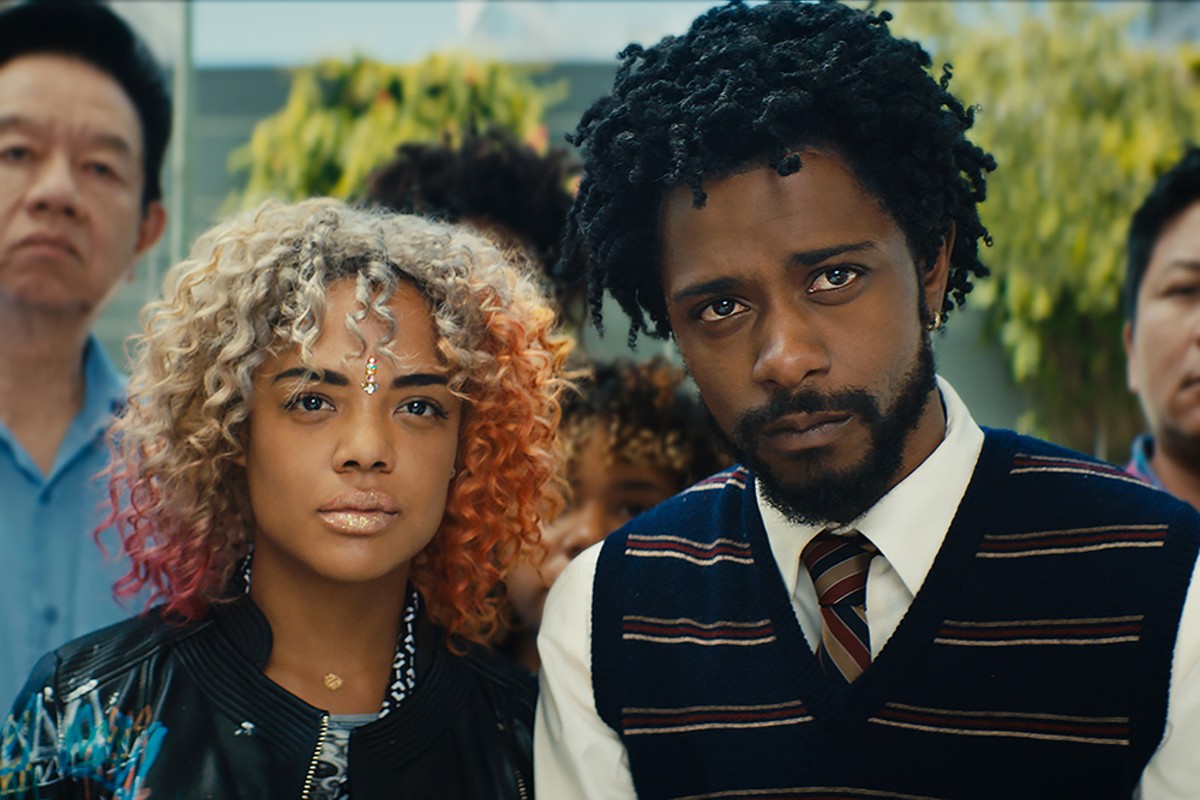We’re not likely to get a sharper comedy this summer than Sorry to Bother You, rapper-turned-writer and director Boots Riley’s new dystopian satire on American competition — set in an ugly present a whole lot like our own. The movie kicks off with an interview for a job at Regal View, a knowingly sleazy telemarketing agency which finely foreshadows the rest of the movie. Every participant’s a bullshitter, but mostly because they have to be — at least when it comes to their job.
That includes our lead as much as anyone: Cassius “Cash” Green (Lakeith Stanfield of Get Out and Snowden), whose stooped, shambling posture, natty style, and default expression of barely-veiled shock help him register perfectly as our mole in the movie’s just-askew world. Faking his credentials to find a way out of his uncle’s Oakland garage, Cash snags the phone sales job (they don’t care about his qualifications) but struggles at it until a coworker (Danny Glover) clues him in to a key trade secret: “Use your white voice.” In Cash’s case, his “white voice” is nebbishy and queasily unnatural (an overdub nailed by David Cross of Arrested Development), and almost instantaneously catapults him toward the upper reaches of both the company and America’s class system — allegorized here as the company’s “upstairs” reaches, where “white voices only” stands as a strict, if officially unwritten, rule.
The need for this burlesque at Regal View’s disparate strata doesn’t play as happenstance or some quirk of the telemarketing industry. Even over the phone (as in his first job interview), Cash is forced to play to white aspirations to succeed. His race, identity, loyalties, priorities — ultimately, his overall sense of self — are necessarily set aside for him to succeed at his job, in ways that align at times with his consent or interests but very rarely with his will or desires. Even as he ascends the (dramatically cartoonish) corporate ladder almost overnight, his racial background is brought into play now and again — most often as something to perform for others’ entertainment, or for his own sense of credibility — but only at the behest of his managers and overseers, almost all of whom are white. The movie’s version of modern segregation — like Get Out’s, in more ways than one — seems to function largely by separating individuals from their own selves, and dampening any moral or social consciousness to make for more pliant workers.
This schism — of achieving radical, overnight success (the Bay Area startup dream) but at the price of one’s sense of self — will seem as familiar to moviegoers as it will to most American workers. And here is a movie that condescends to no one, and which pretends to almost nothing — looking at our world and rendering a just-slightly distorted vision that illuminates it keenly. Cash explores it as we do, and finds it just as strange; the elevator to riches is plush and gilded, the VIP room of the local bar perplexing and filled with lame showboats, and corporate corruption runs top to bottom. Though the movie excels in depicting the flashpoints of moral compromise — relationship friction, union disputes, and the overt and not-coincidental moral horrors of well-paying jobs — its masterstroke is really that this sense of tension is diffuse and unavoidable. Corruption, class, racial tension, and the burdens of inequality are everywhere; they’re merely inflamed by the above. The entry-level telemarketers are serving the same masters as Cash, the elevated corporate stooge, and as the movie delicately elaborates (and does so without apology), they’ll all compromise themselves to varying degrees for the right sum of money — as do we all.
If the satirical subject matter here sounds a bit familiar, I’ll suggest that, while the movie has its fair share of surprises, its style may actually be its best justification. To me it bests Get Out in its sly, casual pitch (many of its actors and technicians come from TV, which may account for this) and sense of pervasive, unshowy personality. Even as it becomes more hauntingly strange, Riley’s direction is relatively straight — characters are shot mostly wide, from the knees or ankles up, the camera serving as our stable eye on an impeccably grounded vision of Oakland rooted in an increasingly woozy, tilted world. Its finer touches, too, all mean something — whether we’re taking in Cash’s patterned suits, which seem to be the last refuge for his sense of self, or his girlfriend Detroit’s (Tessa Thompson) handmade jewelry, which serve both as artistic outlet and guarantor of her activist bona fides, the clothes and dwelling-places and sidewalks all feel like places you could walk around as the days and weeks on-screen pass by. Its characters’ compromises hold weight because the characters feel fleshed-out and lived-in. They actually have selves to lose.
Stay on top of Detroit news and views. Sign up for our weekly issue newsletter delivered each Wednesday.
'Sorry to Bother You' and the virtues of phoning it in

Tessa Thompson and Lakeith Stanfield as star in director Boots Riley’s Sorry to Bother You.
[
{
"name": "GPT - Leaderboard - Inline - Content",
"component": "35519556",
"insertPoint": "5th",
"startingPoint": "3",
"requiredCountToDisplay": "3",
"maxInsertions": 100
}
]





